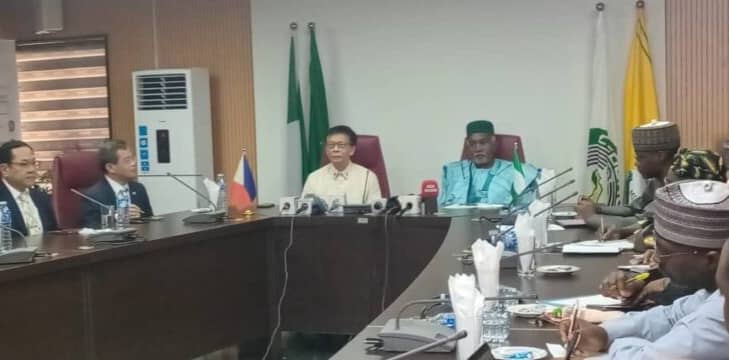Among other things, the Federal Government of Nigeria and the Republic of the Philippines have committed to deepening their bilateral relations on labor and migration.
This was the conclusion of a high-level discussion held in Abuja on Wednesday, when Ambassador Yusuf Maitama Tuggar, the Minister of Foreign Affairs, welcomed the Philippine team headed by Secretary of Migrant Workers Hon. Hans Leo J. Cacdac.
Amb. Tuggar acknowledged the historical connections between the two nations, which date back to Nigeria’s independence, in his opening remarks.
The Minister emphasized the significant contributions made by Filipino professionals in Nigeria throughout the years, especially in the fields of education, aviation, and maritime.
“Filipinos taught a lot of Nigerians in my generation, particularly in STEM subjects. These connections foster the development of cultural bridges and go beyond the exchange of knowledge, according to Tuggar.
According to him, Nigeria is eager to absorb the Philippines’ internationally acclaimed method of managing foreign workers as part of President Bola Tinubu’s foreign policy agenda, which is based on democracy, demography, development, and diaspora.
“As the Philippines does, we want to make sure our own diaspora workers are empowered and protected with respect, dignity, and full government support,” he stated.
Additionally, the Minister mentioned Nigeria’s Technical Aid Corps (TAC) program, which was founded in 1987 and sends qualified Nigerians to ACP (African, Caribbean, and Pacific) nations.
Amb. Tuggar disclosed ambitions to turn the project into a profitable business while also looking for further foreign cooperation.
Cacdac responded by expressing President Ferdinand Marcos Jr.’s directive to strengthen labor ties with partner nations, such as Nigeria, where Overseas Filipino Workers (OFWs) are employed.
Read Also: I Left Because What’s Happening in This Country Isn’t Right’ – Tambuwal Criticizes APC
“We are pleased to see that Nigeria has been a safe and welcoming place for some of our nationals,” Cacdac said after meeting with some of them here. “We are here to strengthen coordination and protection mechanisms and to build on that goodwill.”
Deputy Minister for International Cooperation John Al Rasul, Assistant Secretary for Pre-Employment Concerns Juleen Abito, and Director for Anti-Illegal Recruitment and Human Trafficking Giant Mendez were among the high-ranking officials in the Philippine group.
The employees of the Philippine Embassy in Abuja accompanied them.
Cacdac underlined how crucial it is for both countries to learn from one another in areas like labor system development, anti-trafficking initiatives, and migratory governance. In order to better meet the requirements of Filipino workers in Nigeria and improve communication with local authorities, he also formally asked that a specialized labor office be established within the Philippine Embassy in Abuja.
Our objective is to use institutional cooperation to further fortify interpersonal relationships. Building safer migratory routes for our countrymen and exchanging knowledge about work practices are two examples of this,” Cacdac said.
Secretary Cacdac thanked the Nigerian government for its hospitality and for encouraging greater interaction between the two countries in a press conference following a private meeting.
“The Nigerian government and people, as well as the Honorable Foreign Minister, have our sincere gratitude for the cordial welcome.
“We have received a clear directive from President Ferdinand Marcos Jr. to strengthen our bilateral labor relations for the benefit of both nations.”
Cacdac described Nigeria as a “safe haven” for overseas Filipino workers (OFWs) and underlined the Philippines’ desire in bolstering safety for Filipino migrant workers there.
Additionally, he disclosed that the Philippines is looking into the possibilities of opening an Abuja Migrant Workers Office.
“With targeted programs and services, this will enable us to better serve our people here and their families back home,” he continued.
According to Cacdac, his delegation will also meet with the Ministry of Labor in Nigeria today to discuss bilateral labor agreements, capacity building, and the sharing of information about labor laws and safeguards.
In order to expedite processes and enhance comprehension of each nation’s systems, Secretary Cacdac emphasized the value of reciprocal information sharing.
“Our president has ordered us to streamline domestic bureaucratic procedures, particularly for foreign workers.”
“We support the welfare of both our employees overseas and foreign workers in the Philippines, and we are signatories to the UN Convention on the Protection of Migrant Workers.”
“We are honored and delighted to welcome Secretary Cacdac,” stated Ambassador Tuggar. The Philippines has long been a pioneer in the development of human resources, and many Filipinos have made significant contributions to Nigeria, particularly in the fields of education, aviation, and the marine industry.
As a populous country, the Philippines fits into Nigeria’s demographic diplomacy, according to Tuggar, who also emphasized the strategic alignment of this alliance with President Bola Tinubu’s “4D” foreign policy, which stands for Democracy, Development, Demography, and Diaspora.
“We want our employees to travel overseas in safety and respect. About nine agreements with the Philippines are still outstanding, and Secretary Cacdac has suggested a tenth that would concentrate exclusively on labor, Tuggar stated.
Hon. Dr. Philip “Okanga” Agbese, a transformative leader in Enone. Discover his achievements, community projects, and vision for 2027

